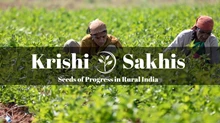
A recent study conducted by researchers at the University of Adelaide, Australia has revealed new insights into molecular pathways regulated by the Photoperiod-1 (Ppd-1) gene, which could potentially lead to increased wheat yields. The findings, published in the journal Current Biology, reveal significant advancements in understanding how genetic alterations can improve wheat productivity.
Photoperiod-1 is a gene commonly utilized by plant breeders to manipulate the flowering time of wheat. By ensuring that wheat crops flower and set grain earlier in the season, this gene helps the plants avoid the extreme heat and drought conditions of summer. However, this genetic modification has its trade-offs. According to Dr. Scott Boden, a Future Fellow at the University of Adelaide’s School of Agriculture, Food and Wine, while Ppd-1 facilitates better alignment of pollination and grain development with favorable environmental conditions, it simultaneously reduces the number of grain-bearing florets and spikelets, ultimately limiting the yield.
Dr. Boden's team explored the genes affected by Ppd-1, identifying two transcription factors that could be modified to enhance the number and arrangement of grain-bearing spikelets on a wheat ear, as well as the timing of ear emergence. One of these transcription factors, named ALOG1, when deleted, was found to increase branching in both wheat and barley. This discovery suggests that ALOG1 is a significant regulator of unbranched spikes in crops within the Triticeae family, which includes wheat and barley.
"The deletion of ALOG1 results in increased branching, indicating its role as a major regulator of unbranched spikes in Triticeae crops," explained Dr. Boden. "This newfound knowledge provides valuable gene targets of Ppd-1 that breeders can use to create genotypes with potentially higher yields."
To further validate their findings, Dr. Boden's team is conducting field trials at the University of Adelaide’s Research Enclosure, testing the performance of the gene-edited lines under real-world conditions. Coincidentally, German researchers have observed a similar effect of ALOG1 in barley, offering exciting clues about the evolutionary pathways of unbranched inflorescences in wheat and barley, compared to the more complex branching patterns seen in rice and corn.
The significance of these findings is underscored by Australia's position as the world's largest wheat exporter. In 2022, Australia produced a record 36,237,477 tonnes of wheat. Given that wheat contributes about 20% of the global human diet's calories and protein, enhancing wheat yield is crucial for food security, particularly as the global population continues to grow.
Dr. Boden highlighted the importance of this research in the context of global food security, noting that wheat yields need to increase by 60-70% by 2050 to meet future demand. "Studies like ours are vital because they identify gene targets that can be exploited using new technologies, such as transformation and gene editing, to generate new genetic diversity that may boost crop productivity," he said. "We anticipate that our research will pave the way for further discoveries of genes controlling spikelet and floret development in wheat, ultimately aiding strategies to enhance wheat yield potential."
The research not only offers promising avenues for improving wheat yields but also highlights the broader potential of genetic research and biotechnological advancements in addressing global agricultural challenges.
(Data Source: University of Adelaide)











